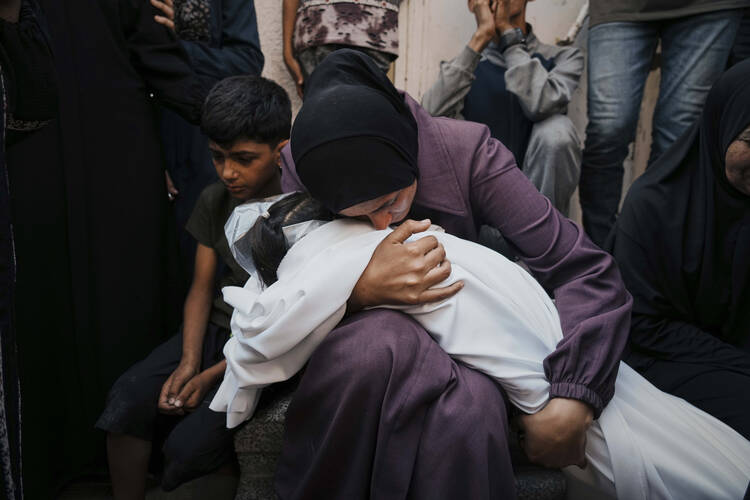One out of every five civilians in Gaza faces starvation. That figure—representing more than half a million people—was reported by the United Nations in mid-May, even before reports that the Israeli military continues to block the distribution of humanitarian aid in the besieged region. Almost the entire population is now food-insecure. In the meantime, the infrastructure of Gaza is in ruins, the result of a year and a half of intense Israeli bombardment and occupation since the Oct. 7, 2023, Hamas terrorist attack on Israel.
Because of the indiscriminate brutality of the initial Hamas attack—and because of the longstanding but complex political relationship between the United States and Israel—many American politicians have been loath to condemn Israel for its seeming pursuit of the complete annihilation of Gaza. Other political figures have not been so reticent, including some in Israel itself: Former Israeli prime minister Ehud Olmert, for example, wrote a column last week in the Israeli daily Haaretz that was headlined “Enough is enough. Israel is committing war crimes.”
Mr. Olmert, who until now had been a firm supporter of Israel’s military campaign in Gaza, wrote that Israel’s continued actions after 19 months of conflict were no longer justifiable. “What we are doing in Gaza now is a war of devastation: indiscriminate, limitless, cruel and criminal killing of civilians,” he wrote. His opinion is shared by many other world leaders. In the United States, however, the president’s position on the war and prospects for peace remains unclear from day to day.
It may be that without the United States’ political and economic weight behind it, no international coalition can do much to influence Israel. The president’s ambiguity has only seemed to encourage Prime Minister Benjamin Netanyahu to continue and even accelerate Israel’s decimation of Gaza. Though polls in recent months have shown that a majority of Israelis themselves support a comprehensive cease-fire agreement, Mr. Netanyahu has vowed to prosecute the conflict until Hamas is completely eliminated. That goal has been conflated at times with a seeming determination to depopulate Gaza; Mr. Netanyahu now endorses President Donald Trump’s obscene suggestion to build a resort on the ruins of Gaza, claiming they were only speaking about the “voluntary” migration of Gazans.
What is lost among such lurid flights of fancy and the blunt logic of realpolitik is a reckoning of the moral responsibility of Israel and its political supporters in the current situation. Worse than simply displaying a casual disregard for civilian casualties, Israel seems to have obliterated the distinction between noncombatants and legitimate targets, a violation of international law and the principles of just war. The images of bombed hospitals and civilian casualties in burning refugee camps have made it clear that the rules of war are far from the minds of many Israeli military commanders and politicians.
To criticize Israel for attacks on civilians and the targeting of non-military assets is not to deny that Israel has a right to defend itself nor to minimize the threat that Israel faces from terrorist actors. Hamas, of course, is also morally responsible for this devastation. Its insistence on remaining in power betrays the people of Gaza, not least by providing an argument for Israel to continue prosecuting the war.
But Israel’s right to defend itself does not mean Israel has an unlimited right to wage total war. It cannot mean that arbitrary amounts of collateral damage to civilians and noncombatants are acceptable so long as the intent is to eliminate Hamas. The moral calculus behind blocking aid for starving women and children because some of it might fall into the hands of Hamas fighters is a case in point: Is the destruction of Hamas worth any price in human suffering?
Hamas’ attack was the immediate cause of this war; Hamas’ insistence on holding onto power allows the war to continue. But it is Israel that decided not to allow food and water into Gaza, producing this ongoing humanitarian crisis. It is the Israeli military that is the power on the ground and has practical responsibility for the people suffering because of its actions. The evils of Hamas do not justify causing a famine. The United States must leave behind indecision and, with a broader coalition of nations, pressure Israel to allow the people of Gaza to be fed.
Ironically and tragically, it is exactly Israel’s absolute commitment to the destruction of Hamas that all but guarantees that Hamas will survive beyond the current conflict, because Israel is further undermining any credibility for seeking peace with the Palestinian people in the future. What does that reality mean for youths tempted to take up arms? What possibility is there that such policies could end the cycle of violence that has plagued the region for decade after decade?
Mr. Netanyahu has committed to continuing the war until the complete destruction of Hamas is achieved, essentially an argument to make Israel safe at any cost. But as Pope Leo XIV reminded the world in calling for aid to Gaza on May 21, this is a war in which “the heart-rending price is being paid by children, the elderly and the sick.” Israel, along with its allies, especially including the United States, must reckon that cost as well.








